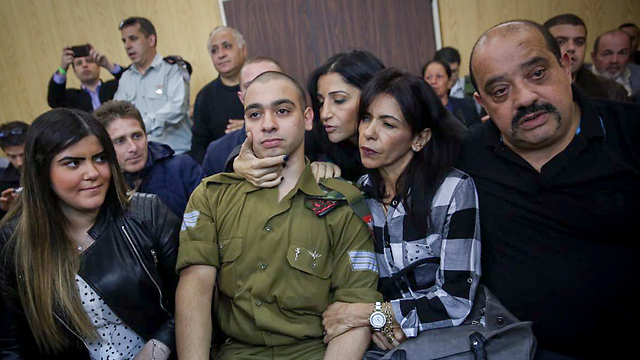Analysis: whether through a presidential pardon or a military one, having a parole board cut his prison time cut short or a surprisingly lenient sentence, the chances of Elor Azaria benefiting from a last-minute savior appear rather slim.
Against a background of ministers and politicians calling on the government to grant pardon to Sgt. Elor Azaria, who was convicted of manslaughter on Wednesday morning for shooting dead seriously wounded terrorist Abed al Fatah al-Sharif who carried out a stabbing attack just moments earlier in Hebron last year, the possibility of such an outcome actually does exists for the near future, albeit a slim one.
According to the law, Azaria is able to submit a full pardon request even before receiving his sentence, which is expected to be given in approximately one month. He is also able to submit his request after a sentence is given and he begins serving his time in a military prison.

As a soldier, Azaria is able to submit his request to one of two officials: the relevant general in the IDF or President Reuven Rivlin. Meanwhile Minister Miri Regev has already sent a letter to Rivlin requesting that he pardon Azaria.
However, the President’s Office responded to Regev’s request by stating that only the convicted individual, a close relative or an appointed representative can request a presidential pardon.
The president or the general are only able to make a decision after the request has been submitted and received the support of the Manpower directorate, the chief military prosecutor, the IDF chief of staff and the minister of Defense.
In the meantime, Rivlin’s office said it will consider a pardon for Azaria at the appropriate time, but that a decision is a long ways away. His office issued a statement on Wednesday, saying that a pardon request would be weighed only “following a conclusive judicial ruling.” With Azaria still facing sentencing and an appeals process, that means the matter may not come before the president for some time.
The statement gave no indication whether Rivlin would support a pardon, only that if a request is made, the president will consider it “in accordance with standard practices and after recommendations from the relevant authorities.”
A military pardon for Azaria unlikely
Regardless of Rivlin’s decision, it seems rather implausible that the relevant military personnel will decide to pardon: IDF Chief of Staff Gadi Eisenkot has already taken a stand against Azaria’s actions and against interfering with the court’s decision; IDF Spokesperson Moti Almoz, who is set to take over as IDF Manpower directorate, has spent the last six months representing the IDF’s official stance admonishing Azaria’s actions; and Chief military Prosecutor Sharon Afek is not expected to support such a pardon, either.
The biggest question mark hangs above Defense Minister Avigdor Lieberman, who vowed to stick with Azaria while still a part of the Opposition. As Defense minister, though, he has voiced his displeasure with the verdict, but called on the public to respect the court’s ruling.
The chances that GOC Central Command Roni Numa—the relevant major general who can decide to pardon Azaria—might decide to exercise this option are even slimmer, as Numa was one of the investigators in the Hebron shooting incident. Upon its conclusion, the investigation found that Azaria acted against IDF engagement procedure with a threatening individual, and that there was no justification for him to open fire in this particular case.
The possibility of a pardon aside, Azaria could still in theory be out of prison before he completes his sentence in full—however long it may be. This would be through an appeal to a special parole committee comprised of legal experts and military personnel, asking that his sentence be shortened. The option of appealing to such a committee is open to any soldier sentenced to more than a year. As opposed to a similar committee in the civil justice system, which can decide to shorten a prisoner’s sentence by one third, such a military committee can order that half of the prisoner’s sentence be taken off. However, such a decision would require that the convicted person express remorse and exhibit good behavior during his time in prison, as well as take into account the prisoner’s personal and familial circumstances.
However, legal military expert Shlomo Rachvi said that the chances for such an intervention are not high, either. “Military mitigation of a sentence … require extreme circumstances. In the past few years there almost haven’t been any cases where a major general decided to mitigate a sentence that was decided in military court, as opposed to sentences decided in a disciplinary hearing, in which they have been known to weigh in.”
A sentencing is due to be given one month after the verdict. According to legal military experts, Azaria’s conviction was no surprise, considering that Central Command Chief Justice Col. Maya Heller systematically rejected all of Azaria’s defense arguments for over two-and-a-half-hours before handing down his conviction. Their assumption is that Azaria’s sentencing will follow along a similar path, and that the court will not be lenient with him.
“My estimation is that it’ll be no less than three years,” said Attorney Shlomo Zipori, a military legal expert who had served in top positions within the IDF Defense. “The verdict was detailed and explained at length, and will doubtless affect the sentencing.” He added that Heller “referred to each clause and claim, thereby preventing the possibility that the lawyers could claim that since certain claims were not addressed, a new trial is in order.”
As reported by Ynetnews
